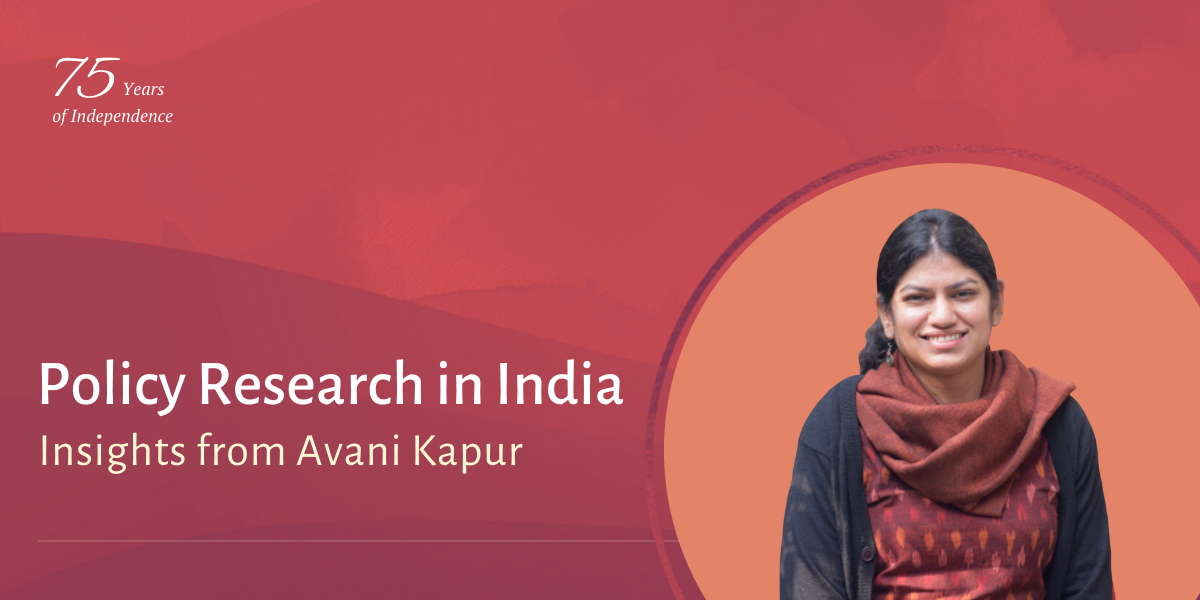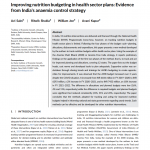
Policy Research in India – Insights from Avani Kapur
13 August 2022
Avani Kapur is a Fellow at the Centre for Policy Research (CPR) and leads the Accountability Initiative (AI). Her own interest has been in building evidence for policy advocacy to strengthen public financial management for service delivery. She is leading research studies on fiscal federalism, health, nutrition, sanitation, and education financing. She has also been anchoring the publication of the annual budget brief series and implementation of fund tracking surveys on key social sector schemes.
As India completes 75 years of independence, we interview Avani Kapur on the impact and future of policy research in enabling responsive governance, a public system that is accountable to citizens in spirit and practice, in the country.
Q. While there is widespread acknowledgement that policy research is important, there seems to be a lack of clarity on whether it is able to bring about social impact. What has been your experience?
Avani Kapur: As a policy researcher, the one thing I have learnt is that it is important to not chase “impact”. This is not to say that impact isn’t important or doesn’t matter — but your focus as a policy researcher should be more on the value you are adding to the knowledge or information on a particular topic, how timely and relevant it is, and how the information can be used by others for bringing change. This could be in the form of providing a new analytical lens of looking at the problem, highlighting any bottlenecks, documenting solutions, and identifying facilitators.
For us at the Accountability Initiative (AI), the aim is to ensure Responsive Governance — or a public system that is accountable to citizen needs. So, our research in that sense is designed to delve deeper into the barriers that exist in translating policy to practice on the ground — be it the bottlenecks that hamper smooth fund flows, process challenges, or absence of decentralisation or autonomy in decision-making when this should not be the case. We want to make the on-ground realities and implementation challenges visible for policy-makers at the higher levels of government administration. It’s interesting to see how even this information is often not available with key decision-makers in a consolidated manner.
I remember a quote by Prof. Ajay Shah where he gave an analogy that, when a new leader comes along, they are the driver of the car. But, what about when the car doesn’t work? To do public policy, you need an engineer and not only a driver — it’s about “opening the hood, understanding what’s wrong ….and fixing it”. At AI, we have been trying to “open the hood” as we speak.
The big challenge though is how do we turn our findings and learnings into actionable results — and that’s something we have started focusing on at AI a lot more. For us, the brilliant work of champions of change who leverage insights and knowledge from our work are indicative of our impact.
Q. Policy research has gained momentum in India over the last 15 years. We see this on the supply side with a number of institutions offering courses in public policy, development studies, etc., and also on the demand side with institutions valuing a skill-set of policy research. How do you think this evolution transpired on both sides?
Avani Kapur: My first response is — about time! I remember when I wanted to study public policy at the master’s level. Not just in India, but globally, there were such few institutions that offered a relevant course. The UK had Development Studies, while the US mostly offered International Development or International Relations. India barely had anything. But, I’m so glad that now there are so many more institutions that offer these skill sets. We have also seen an increase in government fellowship programmes, and a rise in lateral entry appointments into the government.
Personally, I think the multidisciplinary nature of public policy programmes is one reason why these have grown, and also why the demand for such skills is high. Anyone involved in policy-making needs to be agile and should have the ability to look at issues through different lenses. For example, there are times when one needs to put on the ‘economist hat’ and look at the macroeconomic environment as well as questions on efficiency, cost benefit, and risk analysis. At other times, one needs to don the ‘political economist hat’ as there are political economy issues that must be kept in mind while understanding, analysing, and contributing to policy decisions. And there are also times when one needs to put on the ‘implementer hat’ and have a good understanding of the pulse on the ground!
Q. How would you draw parallels to developments in the Indian policy research space to the rest of the world? Where do organisations such as the Centre for Policy Research fit in?
Avani Kapur: There are broadly two kinds of policy research. The first is policy prescriptive or policy co-creation, where you are specifically working with the government and are therefore involved directly. This falls more in the domain of a number of Project Management Units (PMUs) and consulting organisations. The second is policy outreach or even the work that Think Tanks do, where our job is to ensure the regular deepening of debate on key issues and making sure that the government is aware of the emerging opportunities and risks in a particular field.
In India, in recent years, there has been a significant rise in the first kind of policy research, which is much more implementation-based. There is an urgency in the government to do things, and that fits better.
But, there is still a lot of value to be had in the latter — and it shouldn’t always be just about the “doing”. A space like a Think Tank allows us to look across a range of academic disciplines and encompass big thinking around ideas, institutions and concepts of incentives, interests, and power. This also allows one to take a step back and provide visibility on areas that may be neglected in policy-making.
At AI, we have had the opportunity to do a little bit of both. We are currently working with a few state governments where we have received first hand insights into the nuances of policy-making and what it takes to make recommendations actionable and implementable. But, at the same time, we are also focused on policy outreach. We are also documenting experiences of champions of change.
Q. Have you observed any challenging developments in the field?
Avani Kapur: I guess the value of the Think Tank aspect has reduced a bit, especially since there has been some criticism and the idea that you need a Think and Do Tank not just a Think Tank. Also, there are relatively few interdisciplinary Think Tanks left, which is strange given that clearly there is a market for more interdisciplinary knowledge.
Policy research is an exciting space for early-career professionals because it offers an opportunity to engage with a lot of issues that one feels passionately about. This also leads to a conundrum — how to navigate the excitement and curiosity to do a lot?
I would go back to where I started which is to not chase impact and not always be in a hurry. There are things that are urgent and things that are important in any policy-making process. There is a tendency both within the government and also amongst policy professionals to chase the urgent, while letting go of the important.
Being part of a Think Tank, I’ve learnt that a key role one needs to play is in creating centres of knowledge by bringing together different stakeholders and voices, and incubating new ideas and research. I would suggest taking the time and spending effort doing that.
Q. Lastly, what do you envision the contribution of policy research to be, and in particular AI’s research, in the future?
Avani Kapur: As a research group based within a Think Tank one has an important responsibility – especially since one has access to policy networks – to ensure that we are able to convene different stakeholders and that the voice of the last mile is heard at the top. At AI, we have been trying to do that. Our goal is and continues to be to finally have a system of institutions that are designed in a transparent and accountable manner and are responsive to citizen needs. At the same time you need an informed citizenry that can draw on these platforms, such as local communities who know what they are entitled to receiving from the government and are able to access these entitlements. Towards that end, our plan is to build regular, rigorous evidence, and use that to deepen debate and catalyse conversations around change whether it be within the government or outside of it.
Also Read: ‘There are hardly any Administrative Problems with no Solutions’: Interview with OAS Rumana Jafri





